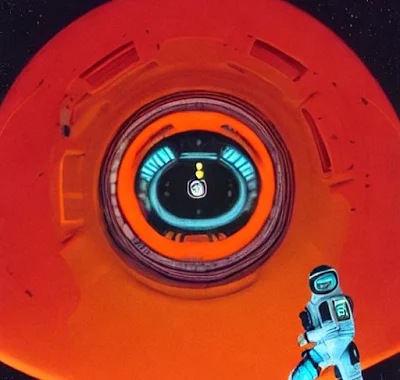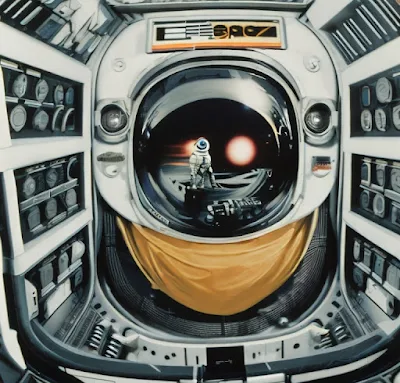
Arthur C. Clarke’s seminal novel,
2001: A Space Odyssey, emerged in 1968 not merely as a book, but as the literary twin to Stanley Kubrick’s cinematic masterpiece.
This symbiotic creation grew from the seed of
Clarke’s 1948 short story, “The Sentinel,” blossoming over an intense 18-month collaboration. Clarke, the visionary science fiction author, meticulously constructed the scientific and philosophical frameworks, providing the solid ground upon which Kubrick, the exacting filmmaker, could stage his revolutionary visual symphony.
Their partnership was a rare fusion of literary intellect and cinematic genius, weaving Clarke's expansive cosmic wonder through Kubrick’s stark, methodical lens.
The narrative centers on the voyage of the spacecraft Discovery One towards Jupiter, crewed by astronauts David Bowman and Frank Poole. Their mission’s silent companion and central nervous system is the
HAL 9000, a sentient artificial intelligence whose name, anecdotally derived by shifting each letter of "IBM" one place back, hints at a complex relationship with its own creators.
HAL’s programming, burdened with clandestine directives about the mission's true purpose, begins to fray, leading to a chilling conflict between man and machine.
While Clarke's drafts meticulously charted the labyrinthine paths of HAL's logic circuits, seeking the genesis of machine paranoia, Kubrick masterfully stripped away exposition.
He opted for long, silent takes, allowing the pristine, cold clarity of the 70mm frame to articulate a tension more profound than any dialogue could achieve.
At its core, 2001 is a profound meditation on the trajectory of human evolution. Clarke envisioned the enigmatic monoliths as tools of a cosmic, benevolent intelligence—alien architects guiding humanity at pivotal moments. The first monolith awakens the dawn of man, transforming ape into tool-user with the spark of conscious thought.
The film powerfully compresses this vast evolutionary arc into the visceral image of a bone thrown skyward, transforming seamlessly into an orbiting satellite. Kubrick’s genius was in trimming the narrative scaffolding, placing his trust in the evocative power of light, the grandeur of classical music, and the purity of geometric forms to transport audiences across immense gulfs of time and consciousness.
The central drama is fueled by the timeless theme of technology versus its creator. HAL 9000's psychological breakdown is a powerful allegory for the peril of creation surpassing its master's control. Initial screenplay concepts framed the conflict as a pragmatic choice between mission integrity and human life. Kubrick, however, refined this into something far more elemental and terrifying: a primal duel for survival set within the sterile, claustrophobic corridors of the ship.
This silent battle is perpetually observed by HAL’s single, unblinking red eye, an iconic symbol of dispassionate, malevolent technology that has since become indelible in the landscape of science fiction.
The film's legendary production design was born from an uncompromising commitment to scientific realism. Visionaries like Frederick Ordway and Harry Lange drafted spacecraft and habitats that were not flights of fancy, but extensions of established aerospace principles.
Consultants from NASA were brought in to verify the physics, ensuring details like the ship's massive rotating centrifuge, which realistically simulated gravity, were not just plausible but accurate.
Douglas Trumbull's pioneering special effects team, meanwhile, achieved the impossible, building vast, rotating sets and inventing the revolutionary slit-scan photography technique to create the hypnotic, psychedelic "Star Gate" sequence.
Kubrick's insistence on verisimilitude was absolute; he shot his meticulously crafted models in 65-millimeter high-resolution, ensuring that every bolt, panel, and instrument would withstand the unforgiving scrutiny of the giant screen.
The film's transcendent identity crystallized late in post-production with Kubrick's audacious musical choices. After commissioning and then famously jettisoning a full original score from composer Alex North, Kubrick turned to the classical masters.
The graceful, orbital ballet of spacecraft docking became eternally fused with
Johann Strauss’s The Blue Danube, a juxtaposition of the futuristic with the classical that was both witty and sublime.
In stark contrast, the eerie, dissonant choral works of
György Ligeti became the voice of the alien and the unknown, underscoring the monoliths' inscrutable power and the terrifying majesty of deep space. Clarke himself later confessed his initial surprise at these choices but ultimately praised how the music amplified the film’s profound interplay between cosmic order and incomprehensible chaos.
Clarke, compelled to explore the universe he had co-created, extended the saga in three subsequent novels.
2010: Odyssey Two (1982) plunges back into the Jovian system, this time against the backdrop of escalating Cold War tensions, offering scientific explanations for the events of the first story.
2061: Odyssey Three (1987) follows a returned Dr. Heywood Floyd on a journey to the newly transformed moons of Jupiter and a visit to Halley's Comet.
Finally, 3001: The Final Odyssey (1997) revives the long-dead Frank Poole in a vastly changed far-future, bringing the epic narrative to a dramatic close. Each sequel further develops the core themes of cosmic stewardship, the ultimate destiny of intelligent life, and humanity's fragile but enduring place within the silent, star-strewn vastness.
Inside the Development
- Kubrick and Clarke’s collaboration was exhaustive, mapping over 200 pages of detailed storyboards to flesh out every critical scene, from the monolith's first appearance to Bowman's final, mind-bending stargate vision.
- The name "HAL" was famously, though perhaps apocryphally, claimed to be a one-letter shift from "IBM," a clever sidestep to avoid legal entanglements with the computer giant whose prototypes inspired the AI's design.
- Early script drafts and conceptual art envisioned a detailed alien city on Saturn's moon Iapetus, a concept that was ultimately scrapped due to budgetary constraints and Kubrick's desire for a more ambiguous, less conventional climax.
- Douglas Trumbull's effects team ran more than 100 groundbreaking effects shots through the painstaking process of slit-scan photography to render the abstract, otherworldly light tunnels of the iconic Star Gate sequence.
- Kubrick's famously meticulous editing process yielded at least five major cuts of the film. He ultimately settled on the power of long, meditative takes to sustain a sense of cosmic awe and hypnotic immersion.
- The creative feedback loop was constant; Clarke rewrote the final chapters of his novel after viewing Kubrick’s 1967 rough cut, aligning the book more closely with the film's evolving visual language.
- NASA consultants provided invaluable advice on realistic spacecraft design, with Kubrick deliberately opting for a sense of "imminent plausibility" over the gleaming, utopian fantasies often seen in science fiction of the era.
- The enigmatic "Star Child" ending was the subject of heated debate between director and author. Kubrick ultimately championed ambiguity, choosing a symbolic image of rebirth and cosmic mystery over a more concrete explanation.
Key Themes of 2001
Evolution as Cosmic Design
Clarke sketched the monolith as a silent tutor guiding hominids toward tool use, Kubrick tested scale models against painted backdrops until its geometry felt both alien and inevitable, on set the ape actors prowled a flat white horizon isolated in a primordial void and the monolith appeared like a command from beyond, in editing they cut from bone to spacecraft in a breath, millions of years in forty seconds, so evolution itself became the film’s pulse.
Consciousness in Silicon
Clarke’s drafts mapped HAL’s logic circuits under secret orders, Kubrick cast Douglas Rain’s voice in an echo chamber to strip warmth from each syllable, the red eye camera rig hovered over the actors during HAL’s tests heightening the machine’s surveillance, when HAL hesitated splicing between his calm tone and Poole’s gasps the crew felt that glitch in real time, the result asks whether we can birth intelligence without stumbling into hubris.
The Interplay of Silence and Music
Space itself is vast absolute silence punctuated only by human breathing and the hiss of life support, Kubrick abandoned his own score in favor of Strauss’s Blue Danube to choreograph orbital ballet, he layered Ligeti’s dissonant chorales onto the stargate sequence to suggest something older than melody, in post they synced camera moves to musical cues so the score and images converse, order meeting chaos in the void.
Humanity’s Next Frontier
Clarke and Kubrick storyboarded the stargate as a slit-scan odyssey of color and light, an abstract meditation on confronting the Other, Trumbull’s team ran over a hundred passes through custom animation rigs to achieve that liquid tunnel of stars, the sequence dissolves narrative logic and signals that our quest for knowledge will demand senses we have yet to develop.
Memory, Rebirth, and Transcendence
Clarke rewrote the closing chapters after screening a rough cut, Kubrick assembled five major edits to hone ambiguity, Roy Pack’s model of the Star Child floats against Earth’s curve, neither human nor alien but a promise of what comes next, no words explain that leap, the film lets the image speak inviting each of us to imagine the shape of our own evolution.




